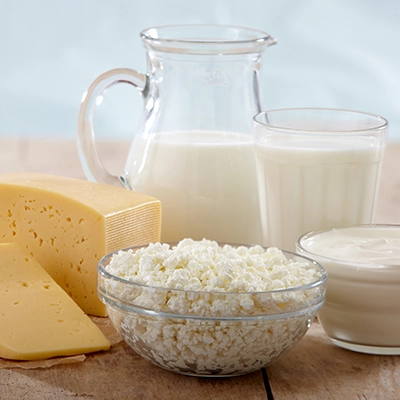Can Cheese Be Part of a Diet to Help Improve Metabolic Health?
For those with Metabolic Syndrome (MetS) who wonder if they need to give up cheese, there is good news: It may not be necessary.
MetS is defined as having at least three of the five following risk factors that increase the risk of stroke, heart disease and Type 2 diabetes: high blood pressure, high blood triglycerides, low HDL-cholesterol, high blood glucose and abdominal obesity. A recent study indicated when participants with MetS followed a low-carbohydrate, high-fat (LC) diet that included cheese (200 grams per day or about five servings per day of Cheddar and Gouda), metabolic health was improved in more than half of participants, independent of weight loss.
After following the LC diet, more than half of the participants (nine out of 16) experienced the reversal of MetS—meaning blood triglycerides, HDL-C and fasting glucose levels were improved. All participants in the LC and moderate-carbohydrate (MC) diets also had improved blood pressure compared to baseline. This study also showed that a high-carbohydrate (HC) diet increased the body’s fat production, while consuming a LC diet enhanced the body’s ability to burn fat for energy.
Additional benefits of following the LC diet were an increase LDL particle size (a beneficial result) and a decrease in levels of the most LDL atherogenic particles (i.e., small dense LDL subclass) independently of the LDL-C blood levels (a beneficial result). Despite the higher saturated fatty acid (SFA) content in the LC and MC diets, blood LDL-cholesterol (bad cholesterol) was maintained in the normal range and stable during the dietary interventions.
These findings are relevant for two main reasons: First, MetS incidence has been growing in parallel with obesity; it is an independent risk factor for type 2 diabetes, heart disease and cancer; and it affects more than a third of the U.S. adult population—so being able to manage it is critical. Second, the traditional dietary recommendation for people with MetS is to decrease fat and calories, partially due to the common belief that SFA intake, which raises blood LDL-C (bad cholesterol), increases risk of heart disease. This study, together with previous investigations, challenge this notion by showing that LC, high fat diets are effective to improve MetS risk factors. And, this study showed that cheese can be part of LC diets that provide positive health benefits.















